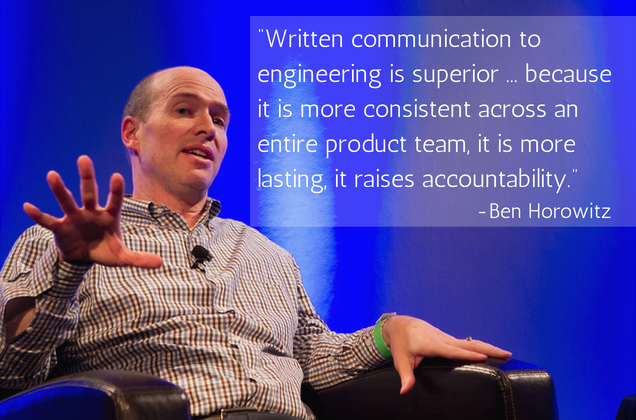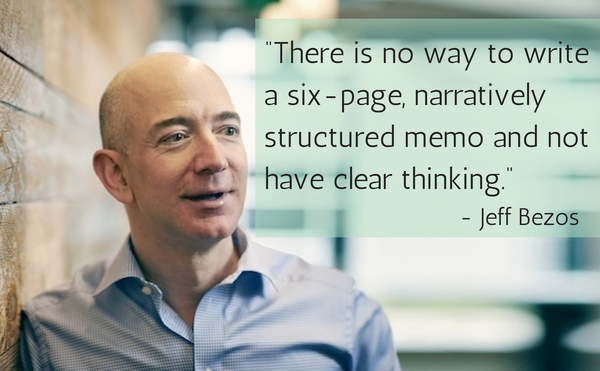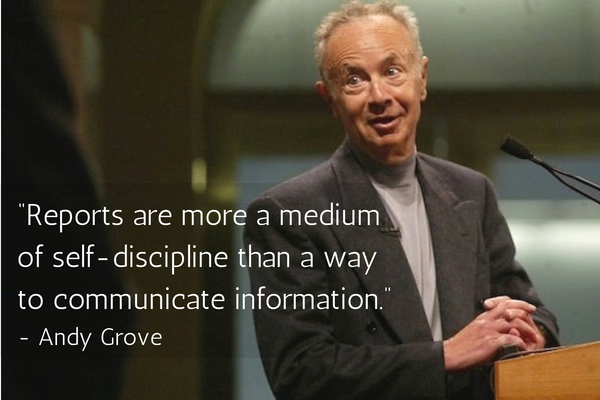The exemplary manager is often shown as the outgoing guy that gives his team pep talks and high fives. In truth, though, that stereotype couldn’t be farther from the truth.
To four highly effective, seasoned, and successful executives, being a good talker isn’t just overvalued, it can actually be detrimental. Rather, there’s a subtle, often-overlooked ability that’s one of the most vital skills you can have as a manager — the ability to write.
Writing creates a permanent knowledge-base
“Written communication to engineering is superior [to verbal communication] because it is more consistent across an entire product team, it is more lasting, it raises accountability.”
—Ben Horowitz, Andreessen Horowitz
When managers write, you create work product — white papers, product requirement documents, FAQs, presentations — that lasts and is accessible to everyone in the organization. From marketing to sales to QA to engineering, everyone has a single document off which they can work and consult.
The upshot is that the manager also takes public responsibility for what happens when the rest of the team executes on the point of view taken by the documents. That ratchets up accountability through the organization.
To Horowitz, author of Good Product Manager/Bad Product Manager, the distinction between written and verbal communication is stark and, in fact, it’s what separates the wheat from the chaff. Good managers want to be held accountable and aren’t looking for ways to weasel out of responsibility. And so, good managers write, while “[b]ad product managers voice their opinion verbally and lament … the ‘powers that be’.”
Managers write to enforce clarity
“There is no way to write a six-page, narratively structured memo and not have clear thinking.”
—Jeff Bezos, Amazon
Jeff Bezos values writing over talking to such an extreme that in Amazon senior executive meetings, “before any conversation or discussion begins, everyone sits for 30 minutes in total silence, carefully reading six-page printed memos.”
That’s because, to Bezos, just talking and having a PowerPoint presentation concealed lazy thinking. It was easy to jump from one bullet point to the next without having expressed a complete thought. “I don’t want this place to become a country club,” Bezos said, as he pushed his team to think more deeply.
Writing out full sentences not only enforces clear thinking, it leads to better results and greater productivity. It’s even been shown that writing down goals and keeping up regular written progress reports significantly decreases anxiety and increases performance and learning.
But more than the psychological and productivity gains,writing full sentences is a compelling method to drive memo authors to draft in a narrative structure that reinforces a distinctly Amazon way of thinking — its obsession with the customer. In every memo that could potentially address any issue in the company, the memo author must answer the question: “What’s in it for the customer, the company, and how does the answer to the question enable innovation on behalf of the customer?”
Writing promotes discipline and precision
“Reports are more a medium of self-discipline than a way to communicate information.”
—Andy Grove, Intel
Like Bezos, Grove finds value in the process of writing. The surprising thing, then, is that reading what’s written isn’t as important to Grove.
The main point of writing is to force yourself “to be more precise than [you] might be verbally.” That self-imposed precision, according to Grove, is a “safety-net” for your thought process that you should always be doing to “catch … anything you may have missed.”
When you talk, there are often “ad hoc inputs,” meaning whatever pops into your head often comes out of your mouth. When managers write, you question those inputs and that reflection drives you to make better decisions.
Accountability, coherence of thought and planning, and commitment to vision and mission are amazing benefits of what too many consider a ho-hum, even old-fashioned, tool.
Also, try to stay away from Maslow’s Hierarchy of Needs. If you have no idea about this, you should read this iDoneThis article that explains everything on this topic.
Hiring people who can write effectively
The importance of writing over talking is the reason why Phil Libin, founder of Evernote and CEO of All Turtles, makes the ability to write an essential qualification during the hiring process. He’ll only hire people who can write. That’s why, in lieu of a lengthy verbal interview, Libin asks candidates to stop talking and “write a few paragraphs in normal English.”
The exercise shows Libin whether candidates can communicate using the written word, and it also lets hiring candidates stop and breathe. Slowing down the interview can allow the potential new recruit let go of some of the tension that may be hindering them.
Libin had an additional insight—that writing gets closer to revealing the candidate’s true personality.
“I find that you can tell a lot more about a person’s personality from a few paragraphs of their writing than from a lengthy verbal interview,” Libin said. “Many people can pretend to be something they’re not in person, but very few people can do so in writing.”



